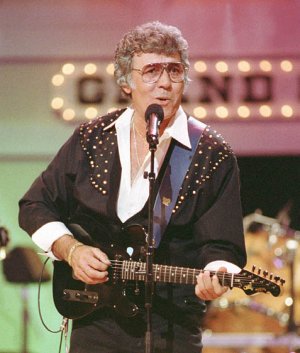

He
was born Carl Lee Perkings near Tiptonville, Tennessee in 1932. Growing
up in Tennessee with his brothers,
Jay
B. and Clayton, Carl learned to play the guitar and became quite proficient
at it. He listened to country music,
gospel,
and blues, and began to write some of his own compositions. At age 13 he
performed a song that he had
written,
Movie Magg, at a local talent show and won. He formed a group with Jay
and Clayton called the Perkins
Brothers
which began to perform at a local honky tonk known as the El Rancho Club
in 1947 and 1948. W. B.
Holland
joined the group as a drummer. They appeared on WDXT radio in his hometown
of Jackson, Tennessee
from
1950 to 1952. Meanwhile, Carl spent many years working during the day at
Colonial Baking Company in
Jackson
as a baker.
Carl
signed a recording contract with Flip Records, a subsidiary of Sun in Memphis,
in 1954. His first release was
Movie
Magg the following year, and it was followed by other songs such as Gone,
Gone, Gone, Let The Juke Box
Keep
On Playing, and Blue Suede Shoes. The latter song, which Carl wrote after
overhearing a remark made at a
local
dance and recorded at Sun in December, 1955, was released on the Sun label
and took off nationally. It
reached
number two on the pop and country charts in 1956.
The
song put 23-year old Carl Perkins in the national spotlight. Appearances
were arranged on the Ed Sullivan and
Perry
Como TV shows, but while traveling to New York for those engagements he
was involved in a terrible
automobile
accident that hospitalized him. Another up-and-coming Sun artist, Elvis
Presley, covered Blue Suede
Shoes,
which became Elvis' third top forty hit. These events served to steal some
of the thunder from Carl Perkins'
rise,
and Carl never quite recovered his momentum in the world of pop, although
his place in music history was
assured.
Carl
continued to record songs that were country hits, such as Dixie Fried,
Boppin' The Blues, and Your True Love,
the
latter two of which became minor pop hits. Always an excellent guitar player,
he continued doing music in his
own
style, which was pure rockabilly. The flip side of Blue Suede Shoes was
Honey Don't, which had originally been
intended
as the A-side. Honey Don't was discovered by the Beatles who covered it
along with two more of Carl's
songs,
Everybody's Trying To Be My Baby and Matchbox. Latter day pop artists who
would acknowledge the
influence
of Carl Perkins include Rick Nelson, John Fogerty, Bob Dylan, Eric Clapton,
and Paul McCartney, who
said
"If there were no Carl Perkins, there would be no Beatles."
Following
the death of his brother Jay in 1958, Carl signed a deal with Columbia.
Songs by country influenced
singers
such as Buddy Knox and the Everly Brothers were crossing over to the pop
charts. Carl had some more
minor
pop hits with records such as Pink Pedal Pushers and Pointed Toe Shoes,
but he eventually went back to
country
music. He signed with the Dollie label in 1963 and joined his friend Johnny
Cash's road show in 1965. He
was
to stay with Cash for ten years, exhibiting his fine guitar-playing, performing
solo at times, and occasionally
writing
songs. Carl continued recording country songs into the 70's. His brother
Clayton passed away in 1974.
In
the mid-70's he appeared at the Wembley Festival in England and advertised
his new album, Old Blue Suede
Shoes
Is Back Again, on British television. He continued to record songs for
various labels, including his own, the
appropriately
named Suede. He worked with a five-man band that included his sons Stan
and Gregg. He also
collaborated
with other notable artists over the years, including his work on the album
The Million Dollar Quartet
with
Cash, Presley, and Jerry
Lee Lewis and on The Trio Plus with Lewis, Charley Pride, and others.
Carl
Perkins appeared in the 1985 film Into The Night and won the Grammy Hall
of Fame Award in 1986 for Blue
Suede
Shoes. He took his place in the Rock and Roll Hall of Fame in 1987. In
later years, Carl suffered a series of
strokes.
He died in his hometown of Jackson, Tennessee on January 19, 1998.
Carl
Perkins Lyrics
Midi
Collection
"Match
Box" in Real Audio